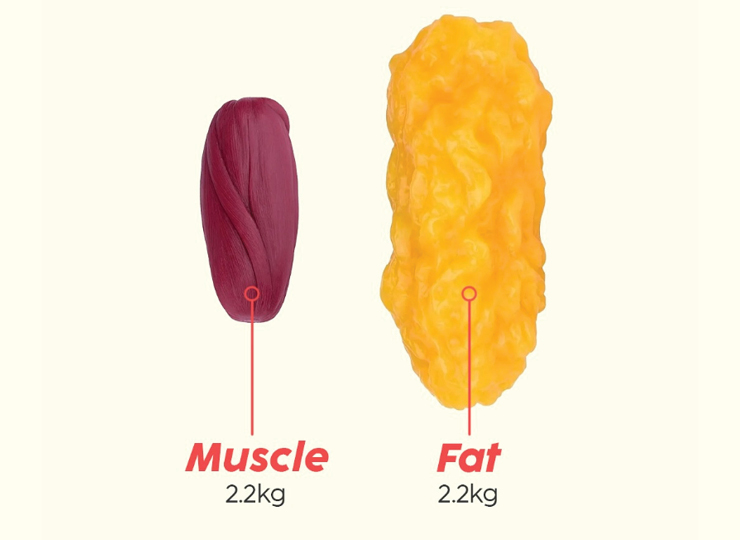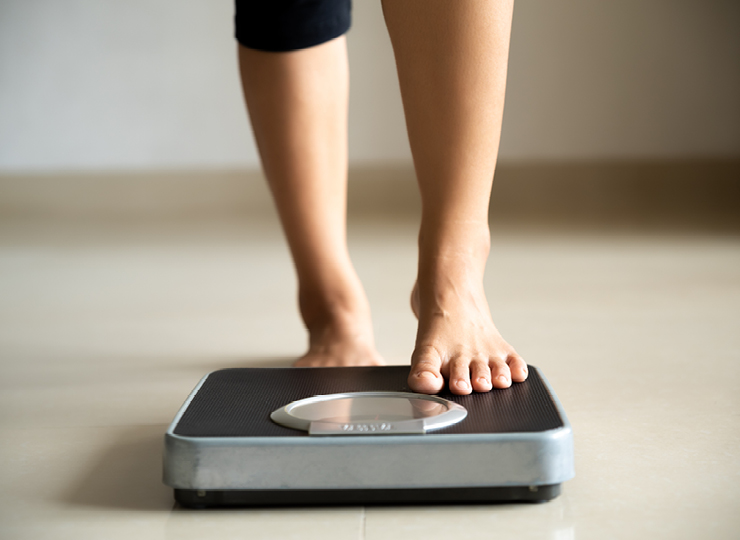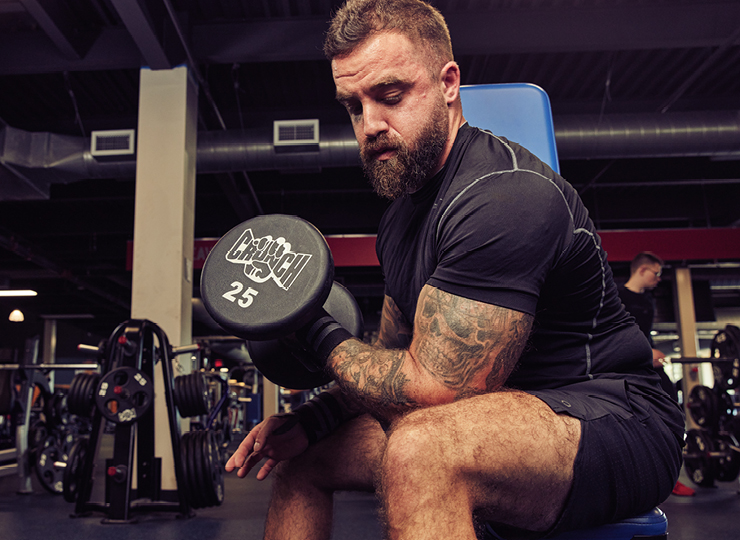
Starting a new workout routine is an exciting step toward better health. Still, many people are surprised when the number on the scale increases instead of decreases.
If you’ve been exercising consistently yet experience unexpected weight gain, there’s no need for concern. This is a common occurrence and is a positive sign of progress in many cases.
Gaining weight while working out can be due to several factors, including muscle growth, water retention, changes in dietary habits, hormonal fluctuations, and digestion adjustments. These changes are often temporary and indicate that your body adapts to increased physical activity.

For example, strength training programs can increase muscle mass, which adds weight but improves overall body composition. Similarly, post-workout inflammation and water retention can temporarily affect scale weight, even if you are losing fat.
Understanding these factors can help you focus on long-term fitness goals rather than short-term fluctuations.
In this article, we’ll explore four possible reasons you might be gaining weight despite regular exercise and provide insights on staying on track with your health and fitness journey.
Muscle Weight Gain: More Weight Can Mean More Progress
If you’ve started a new workout routine and notice the scale going up instead of down, don’t stress—this could be a sign that you’re progressing! Many expect immediate weight loss, but muscle growth is one of the first changes your body experiences with strength training or resistance workouts.

Why Does Muscle Weight Matter?
- Muscles are heavier than fat, but they are more compact – This means you can weigh more while looking leaner.
- Your metabolism gets a boost – More muscle = more calories burned, even at rest.
- Fat loss isn’t always reflected on the scale – Even if the number isn’t dropping, you might be losing body fat and gaining strength.
The scale only tells part of the story. Post-workout inflammation, water retention, and increased food intake (because you’re burning more energy) can all cause temporary weight gain. Instead of the scale, focus on how you feel, your clothes fit, and your energy levels.
Rather than worrying about weight gain, celebrate that you’re getting stronger, fitter, and healthier. Your body adapts to exercise in the best way possible—by building muscle and improving overall body composition.
4 Possible Reasons Your Workouts Are Causing Weight Gain
1. Diet and Nutrition’s Role in Gaining Weight
Exercise impacts your appetite, making weight loss trickier than expected for some people. The key is understanding what’s happening in your body and making small, strategic adjustments.
The Hunger-Workout Connection
Starting a new workout routine—especially one that includes strength training or high-intensity cardio—can increase your appetite. Your body burns more calories, works harder to repair muscle fibers, and demands more fuel. The challenge? If you’re eating more calories than you burn, you may not see the weight loss you aim for.
Some studies show that exercise temporarily suppresses hunger, while others indicate it ramps appetite. The truth is, it varies by person. If you find yourself constantly hungry post-workout, try these strategies:
- Stay Hydrated: Sometimes, thirst masquerades as hunger. Drink plenty of water before and after exercise.
- Prioritize Nutrient-Dense Foods: Reach for protein, fiber, and healthy fats to keep you full longer.
- Watch Sneaky Calories: Sports drinks, post-workout smoothies, and energy bars can add up fast. Stick to whole, minimally processed foods.
Small Food Swaps for Big Results
Making smart choices doesn’t mean starving yourself. Try these swaps to fuel workouts while managing weight:

- Swap red meat for lean protein like chicken, fish, or beans.
- Choose frozen fruit over ice cream for a sweet fix.
- Replace processed snacks with nuts, yogurt, veggies, and hummus.
- Opt for whole foods instead of fast food to improve body composition.
Remember, a healthy diet supports your fitness journey beyond just weight loss. It fuels muscle growth, improves energy levels, and helps you perform at your best.
2. Health Issues + Weight
If you consistently follow your workout routine but still notice unexpected weight gain, other factors could be at play. While diet and exercise are the biggest influences on body weight, underlying health conditions can sometimes contribute to changes in body composition.
Insulin Resistance and Weight Gain
Your body relies on glucose for energy during exercise. Still, if it doesn’t respond properly to insulin, it can lead to insulin resistance. This condition affects how your body processes sugar, making it harder to lose weight and easier to store fat. Factors like genetics, diet, and thyroid function can contribute to insulin resistance, which may impact your weight loss efforts.
Thyroid Issues and Metabolism
Your thyroid plays a key role in regulating metabolism. When it’s not functioning properly—especially if it’s underactive (hypothyroidism)—your body may burn fewer calories, leading to weight gain. In fact, millions of people in the U.S. experience thyroid-related issues that can make losing Weight more challenging. Common symptoms include fatigue, changes in appetite, and difficulty shedding pounds despite exercise and a healthy diet.
What Should You Do?
Exercise and eating healthy can support overall health. Still, if you suspect a medical condition is affecting your progress, it’s best to consult a healthcare provider. A doctor can help determine if insulin resistance, thyroid function, or other factors contribute to weight gain.
Remember, a fitness journey is about more than just the number on the scale—it’s about feeling strong, energized, and healthy in your body.
3. Understanding Water Weight Gain
Noticing a sudden jump on the scale? Don’t stress! Temporary water retention is one of the most common reasons for weight fluctuations—it’s not fat gain, and it’s completely normal.

What Causes Water Retention?
Your body holds onto water for several reasons, including hormonal changes, diet, and exercise. If you have a menstrual cycle, you might experience bloating and fluid retention, especially right before your period.
Research shows that water retention peaks on the first day of your cycle and gradually decreases afterward. While staying active can help with symptoms, the scale may still show an increase.
Sodium and Your Scale
Eating too much sodium can also cause temporary water weight gain. Salty foods make your body retain extra fluid, leading to a higher number on the scale. And the tricky part? Even if you don’t add salt to your meals, processed foods, canned goods, soups, and even some “healthy” options like cottage cheese can be loaded with hidden sodium.
How to Reduce Water Retention
- Stay Hydrated – Drinking plenty of water helps flush out excess sodium.
- Watch Your Sodium Intake – Opt for fresh, whole foods instead of processed options.
- Keep Moving – Regular exercise supports circulation and helps regulate fluid balance.
Instead of fixating on daily weight changes, focus on long-term improvements like your strength, endurance, and overall feeling. Your body is doing the work—trust the process.
4. Why Sleep Matters for Your Fitness Goals
If you’re working hard at the gym but still noticing unexpected weight gain, your sleep schedule might be the missing piece of the puzzle. Sleep plays a crucial role in muscle recovery, hormone regulation, and overall well-being. Your fitness progress could take a hit if you’re skimping on rest.
How Lack of Sleep Affects Your Weight
Not getting enough sleep (less than the recommended 7-9 hours per night) can reduce your body’s natural balance. Here’s how:
- Hormonal Imbalance – Sleep deprivation affects appetite-regulating hormones like ghrelin and leptin. This can lead to increased hunger and cravings, making it harder to maintain a healthy diet.
- Slower Recovery – Your muscles need time to repair after workouts. Poor sleep can delay this process, impacting muscle growth and strength gains.
- Higher Caloric Intake – Studies show that people who don’t get enough sleep tend to consume more calories throughout the day, which can lead to weight gain.
- Disrupted Metabolism – Lack of rest can alter your body’s circadian rhythm, which influences metabolism and fat storage.

Prioritize Rest for Better Results
To support your fitness journey, aim for quality sleep each night. Try these tips:
- Stick to a consistent sleep schedule.
- Avoid caffeine and screens before bedtime.
- Create a relaxing bedtime routine.
How to Stay Motivated When the Scale Goes Up
Stepping on the scale and seeing a higher number can be frustrating—especially when you’re putting in the work at the gym. But don’t let it shake your motivation! Weight gain isn’t always bad—it could mean you’re building muscle, retaining water, or simply adjusting to a new workout routine.
Here’s how to stay on track:
Measure Progress Beyond the Scale
Pay attention to how your clothes fit, your energy levels, and your performance at the gym. If you’re strength training, you’re likely building muscle mass, which can increase your weight but improve your body composition by reducing body fat.
Find Helpful Ways to Stay on Track
- Set performance goals – Instead of obsessing over weight loss goals, aim to lift heavier, run longer, or master a new exercise.
- Take progress photos – Visual changes in your body can be more motivating than the scale.
- Stay consistent with a balanced diet – Eating healthy and staying hydrated will support your fitness journey.
- Talk to a personal trainer – They can help you focus on gaining strength, losing fat, and feeling your best!

Reach Your Fitness Goals With Crunch
Weight is just one small piece of your fitness journey. If you gain weight while working out, consider other signs of progress: more muscle definition, better endurance, improved strength, and overall well-being.
Crunch promotes a culture of positivity, inclusivity, and fun with no judgments by providing an environment for all individuals regardless of their health and fitness goals. Find a Crunch gym near you to try our free trial membership, or join Crunch now. We’re here for you – at the gym or at home. Access the best live & on-demand workouts anytime, anywhere with Crunch+. Ready to get sweaty? Try hundreds of workouts for free! Start your free trial now!
FAQ’s
How much weight can you gain after exercise?
Weight gain after exercise varies based on body composition, food intake, and workout type. A temporary increase of 1 to 3 pounds is common due to water retention, glycogen storage, and muscle recovery.
Will I gain weight when starting a new exercise program?
It depends! Strength training and higher calorie intake can lead to muscle weight gain. In contrast, cardio and a calorie deficit may promote weight loss. Initial weight fluctuations are normal as your body adjusts.
What exercises help with weight gain?
Strength training is key! Focus on compound movements like squats, deadlifts, bench presses, and rows to build muscle mass. Pair it with a high-calorie, protein-rich diet for optimal results.



















































































































































































































